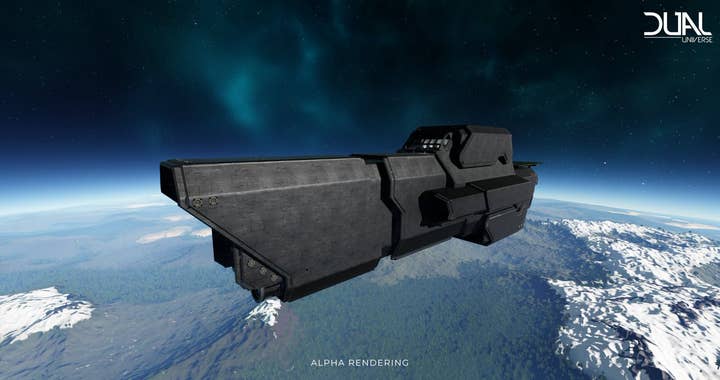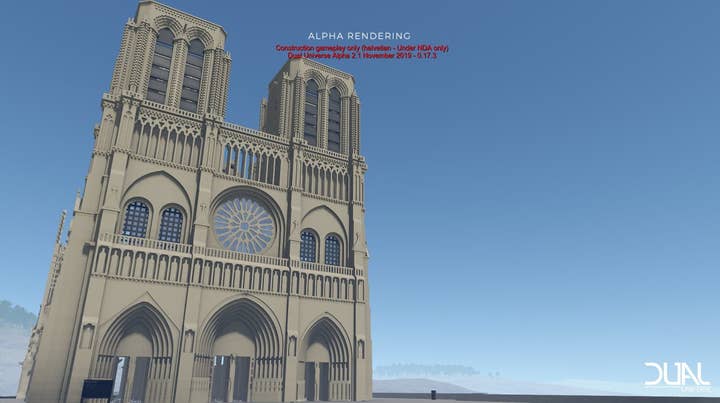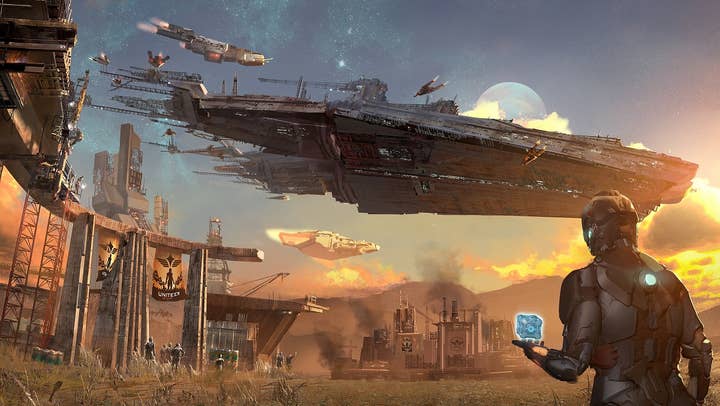"The devil is in the details" when creating a metaverse
Novaquark's user-generated MMO Dual Universe is clear on its grand ambition, but has lots of specifics to nail down
Today marks the launch of Dual Universe's Alpha 3 Test period. It has been a long road to this point -- the MMO has been in the works at developer Novaquark for six years -- and there's still a ways yet to go. Speaking with GamesIndustry.biz at the Montreal International Gaming Summit in November, Novaquark founder Jean-Christoph Baillie readily admits there are plenty of aspects of the game that haven't yet been nailed down.
That's somewhat expected, considering the scale of ambition behind Dual Universe. The game's website bills it as a civilization-building MMO, "a continuous single-shard sandbox MMORPG taking place in a vast fully editable sci-fi universe, focusing on emergent gameplay with player-driven in-game economy, politics, trade, and warfare." Baillie namechecks games like Minecraft and Eve Online while explaining just what Dual Universe is intended to be, but the even-bigger picture goal implied by the game's name sounds more like the metaverse concept that numerous developers have tried to realize with varying degrees of success.
"This is a tradition that goes back as far as I can remember in science fiction," Baillie concedes. "It's not a new idea. But one thing that's central to making this work is technology. It's been six years. The technology we've developed is absolutely crazy complex. We have had some of the best ingenious PhDs working on that for several years. I'm not saying nobody can do it, but it's not something you can do in your garage in two days. It's really complex."
"This is a tradition that goes back as far as I can remember in science fiction. It's not a new idea. But one thing that's central to making this work is technology"
Baillie adds that no matter how talented developers were in years past, they would still have needed the infrastructure of today -- like high bandwidth connections and powerful client-side machines -- to realize this particular metaverse vision. Finally, he suggests that previous stabs at the concept like Second Life could have been focused in more appealing directions.
"The devil is in the details," Baillie says. "The particular angle Second Life took was interesting -- you can't deny it was a success -- but the problem is it's not a game. So it's not really fun. It's more like a web browser in 3D, which was a big thing at the time... We start with the idea that we want to make it fun and make it a game... So we focus on entertainment. That's the main goal of how to make the metaverse start."
It's obviously a lot of work to build an entire universe, but Novaquark is counting on its users to help out. Dual Universe will rely heavily on user-generated content. Baillie says there will be some developer-authored content like an introductory area intended to help onboard new players, but it's not a core focus of the development team. Instead, they're designing tools and systems that they hope users will take advantage of to create the universe they want to live in. He estimates about 5% of the player base will get hardcore into creating content -- everything from ships and buildings to corporations and nations -- and give the other 95% things to do.

"We give them the tools so they will be able to create what you would traditionally call a quest in a game," Baillie says. "We basically look at it more like a job. They publish jobs. 'We're looking for miners. We're looking for pilots to fly our defense fighters. We're looking for people to manage whatever.' They're going to publish what they need, and they'll go hunt among the new players coming into the game to attract them, to say, 'Come with us, we're going to give you a ship and train you and so on...'"
Baillie acknowledges he can't be quite certain what the moment-to-moment gameplay will be for the average Dual Universe player, but says that's the nature of making an emergent sandbox. He believes the key is to get a critical mass of players such that the 5% of that crowd that gets into making content will create a critical mass of content for the other 95% to consume. That's part of why Baillie says the game's single-shard approach is essential; dividing the player population would make it harder to reach that critical mass that allows for players to specialize in all the areas they would need to produce a great experience.
Naturally, this leads into a discussion about how Novaquark plans to moderate this emergent sandbox populated by unpredictable players and their creations. Novaquark knows different players will have different tolerances for their fellow players' behavior, and is planning to create some affordances for that. There will be "sanctuary planets" without PvP action, as well as safe zones, and players can claim their territory in those spots, giving them the equivalent of a square kilometer home base where other players aren't allowed to break anything, dig in their ground, or otherwise impact them.
"We sell a fantasy where we don't want to see the things of the real world from today oozing inside this virtual world. You don't expect to see political things in a Star Wars movie. That doesn't make sense"
As for how Novaquark will deal with specific player actions that cross a line, Baillie has a model in mind.
"You have to recognize that we are a user generated content-based company, a little bit like YouTube, Facebook, and those kind of things," Baillie says. "We have users, we give them tools to produce content, and there will be abuses and there will be issues. There will be ways in the game to report content you find abusive. We are going to publish a user-license agreement that says what is accepted and what is not. But at the end of the day, it will look like what the people at Facebook and YouTube have to do."
Of course, players will also communicate with one another in Dual Universe, and the content creation tools will give them plenty of new avenues for doing that in a creative way. So how does Novaquark plan to balance free expression for its players against the desire to keep offensive content out of the game?
"It's a good question and we don't have an official answer yet," Baillie says. "I am myself in favor of free speech. It's also a problem that what you find offensive is highly cultural dependent. So it's very difficult to give a clear answer to that. What I think is important is that we sell a fantasy world that is actually taking place 10,000 years in the future. So for me there should be no political proselytism, no religious proselytism, no reference to things that are part of history that doesn't clearly exist in this world. That's a way to draw the line.
"There's no way you can have pictures of Donald Trump in this universe because Donald Trump was dead almost 10,000 years ago and no one remembers him and that's it. It doesn't fit into the universe. So that's the angle we want to push. We sell a fantasy where we don't want to see the things of the real world from today oozing inside this virtual world. You don't expect to see political things in a Star Wars movie. That doesn't make sense. The same thing applies here."
We point out that by that standard, Nazi flags and LGBTQ pride flags might both be barred from the game. Baillie stresses that he wouldn't put those things on the same level, but notes that it can be a more complex issue than it initially seems depending on the context such symbols would be used in.
A rule against real-world contemporary culture in Dual Universe would also shut off the game from hosting a long-time staple of any user-generated-content-driven game: IP-infringing recreations of players' favorite brands. With that in mind, we ask hypothetically if a 500-foot-tall statue of the comic strip cat Garfield would be tolerated in Dual Universe.
"There's a very big difference between a Nazi symbol and Garfield in my opinion," Baillie says. "I don't see any problem with Garfield. You could always say it's a cultural icon that somehow survived the trials of time, maybe."
He adds it will be fine to do something like invent a new in-game religion and promote it to other players, but it would be forbidden to bring real-world religions into the game. (Last week, Novaquark posted a community spotlight column celebrating a player's in-game recreation of Notre Dame Cathedral, raising questions about what type of exceptions to the "no real-world religions" rule will be extended.)

"We will have clear guidelines so that what we offer to players is this fantasy that you're role-playing in a world that takes place 10,000 years in the future," Baillie says. "And we want to stick with that logic."
Another common concern with user-generated content stems from how companies build their businesses upon the time, effort, and creativity of their customers. With that in mind, we ask about plans to somehow compensate the users who make the content that are the reason the other 95% of Dual Universe players stick around.
"If it's not just a game --if it's about making a living -- suddenly it changes the perception of the game. It changes the kind of people you have in the game"
"This is a big topic we would like to address but we don't know exactly how to do it properly," Baillie says. "Obviously we would like to reward the most contributing content creators. They bring a lot of value to the game and to other people. We don't have a mechanism in place. We have tons of ideas, but it's too soon to [talk about]."
He adds, "This is also a little bit dangerous because if it's not just a game --if it's about making a living -- suddenly it changes the perception of the game. It changes the kind of people you have in the game. You'll have a lot of people who are basically 'farming.'"
Baillie suggested there might be a mechanism so that "only genuine community-approved content creators could make a living out of it." Even then, he doesn't want to do something as straight-forward as letting players cash out their in-game currency for real-world money, partly for the legal implications, and partly for how it would impact the player experience.
"You're this guy doing logistics, driving this big truck in space with cargo, and suddenly you realize this cargo is worth $10,000," Baillie says. "It's not fun anymore in the same way if you get attacked by pirates. Maybe this is your vacation going away, or your children's college [fund]. This is bad. And we're trying to make an entertainment platform where it's about fun. That would get in the way."
There are a lot of questions about Dual Universe yet to be answered, but Baillie says that's only to be expected given the factors surrounding its development.
"This is a start-up company," Baillie says. "We have private investors. We raised €20 million so far. We want to disrupt the MMO industry with something radically new. It can fail; that's possible. The number of unknowns is considerable, but this is typical of a start-up trying to do something new based on technology.
"If we succeed, that would create a new type of experience that would refresh the industry with something new. That's what we're fighting for."
Disclosure: MIGS provided travel and accommodations for GamesIndustry.biz to attend the event.


